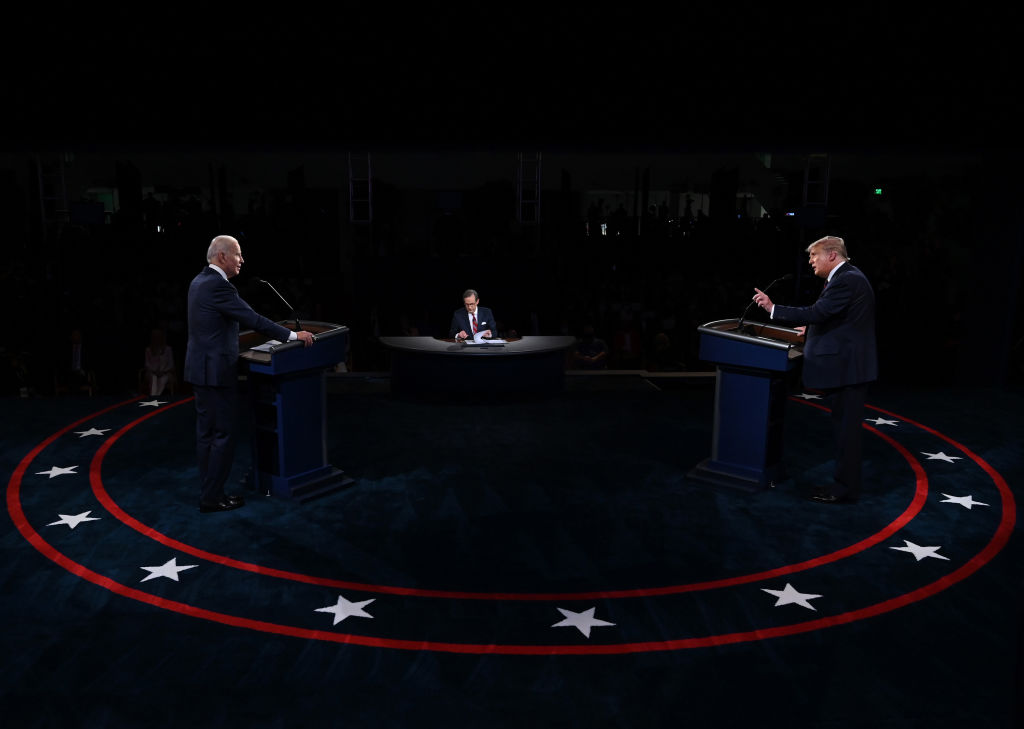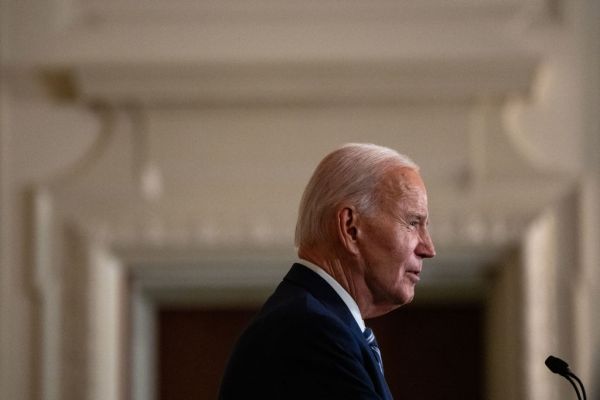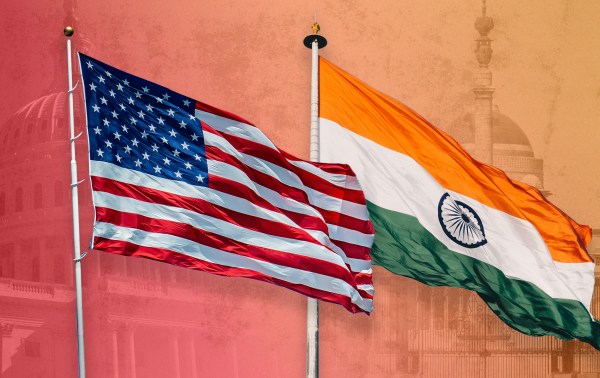Happy Thursday! Robert F. Kennedy Jr. posted a video on Instagram this week introducing the two ravens he’s coaxed into hanging out on his balcony by giving them food every morning. He’s hoping to teach them to eat out of his hand.
Sure, why not?
Quick Hits: Today’s Top Stories
- A Russian court on Wednesday sentenced U.S. Army Staff Sgt. Gordon Black to almost four years in prison following his arrest last month in the eastern city of Vladivostok, where he was visiting the Russian woman he had been seeing romantically. The woman, who apparently alleged that he had stolen about $100 from her and threatened her life, has not been publicly identified. Black denied threatening the woman but pleaded guilty to the theft charge, which the court argued had inflicted “considerable harm.”
- U.S. Central Command (CENTCOM) announced on Wednesday that the U.S. military had conducted an airstrike in Syria on Sunday that killed a top Islamic State leader, Usamah Jamal Muhammad Ibrahim al-Janabi. “His death will disrupt ISIS’s ability to resource and conduct terror attacks,” CENTCOM said, adding that there were no indications of civilian casualties as a result of the strike.
- Hundreds of people have reportedly died from the heat during the Muslim Hajj pilgrimage to the holy site of Mecca in Saudi Arabia, though the exact number of fatalities is difficult to ascertain. Temperatures have topped 120 degrees Fahrenheit at points during the nearly week-long pilgrimage that drew almost 2 million people.
- Russian President Vladimir Putin and North Korean leader Kim Jong Un signed a mutual defense agreement on Wednesday during Putin’s trip to Pyongyang—his first in almost 25 years. The deal affirmed that the two countries would come to the other’s defense if they faced “aggression,” but further details were not clear. The two countries have deepened their military cooperation since Putin’s 2022 invasion of Ukraine, with North Korea seeming to provide ammunition to Russia in exchange for additional spy satellite technology.
- The Senate voted 88-2 on Tuesday to pass a bill that aims to speed advanced nuclear reactor development in the U.S., easing permitting requirements and licensing costs and creating additional incentives for the advancement of the technology. The bill now goes to President Joe Biden for his signature, after a similar bill passed the House in February.
- Louisiana’s Republican Gov. Jeff Landry on Wednesday signed a law requiring public schools in the state to display a copy of the Ten Commandments. “If you want to respect the rule of law,” he said, “you’ve got to start from the original law giver, which was Moses.” The American Civil Liberties Union said it will sue the state over the measure.
What To Expect From Next Week’s First Presidential Debate

Viewers tuning into a debate between President Gerald Ford and then-Governor Jimmy Carter in 1976 were treated to one of the rarest spectacles in politics: 27 minutes of silence. The debate’s audio cut out due to a failed 25-cent electrical component that took nearly a half-hour to find and fix.
Those tuning into the first debate of the 2024 cycle between President Joe Biden and former President Donald Trump on June 27 may be hoping for the same thing.
Next week’s CNN-hosted debate in Atlanta, Georgia, is unprecedented several times over: The contest between two historically old and unpopular candidates—one of whom is a convicted felon—is taking place earlier than any general election debate in recent memory and under fairly unconventional rules. National surveys and swing-state polls have for months shown Trump with a slight advantage over the incumbent, though his lead is often within the margin of error. Will a debate shake up the race?
Usually, presidential debates present candidates—particularly the challenger—to introduce themselves to the broader American public, giving voters who may not have been watching the primary process closely a chance to familiarize themselves with their options. This time, however, Biden and Trump need no introduction: both have served a term as president and have been fixtures in the national media for a half-century.
No, voters know who their options are, and most of them aren’t fans. A Gallup poll last month—in the field before Trump’s May 31 felony convictions in New York—showed Biden and Trump pulling equal favorability ratings, with 46 percent of respondents viewing the candidates favorably overall. Among the majority of respondents who’ve soured on the two candidates, Trump seemed to provoke a more extreme response, with 40 percent holding a “highly unfavorable” opinion of him compared to 35 percent for Biden on that score. But all told, Biden was slightly more unpopular with respondents, with 54 percent rating him unfavorably compared to 52 percent who thought poorly of Trump.
Perhaps expectedly given that data, that race has been tight for months. National RealClearPolitics (RCP) polling averages show Trump ahead of Biden by 0.5 percentage points in a two-way race—a statistical tie—and up 2.4 percent nationally in a five-way race that also includes independent candidates Robert F. Kennedy Jr. and Cornel West, and Green Party candidate Jill Stein (but not Libertarian Party nominee Chase Oliver). Biden got some good news last night—a Fox News poll that a three-point swing in his direction since last month—but he hasn’t led Trump in the average of either configuration since September. RCP’s polling averages also show Trump ahead in seven key battleground states: Arizona, Nevada, Wisconsin, Michigan, Pennsylvania, North Carolina, and Georgia. Of those, the former president’s weakest polling showing seems to be in Wisconsin and Michigan, where Biden and Trump are in a statistical dead heat.
Even though he has a slight polling edge, Trump also seems to have a ceiling, failing to eclipse 48 percent in the RCP average at any point in a two-way race. In a five-way race, Trump’s high-water mark is 43 percent.
It’s not just election fatigue that has this debate seeming earlier than ever: General election debates have never been held before late September after both candidates are officially nominated at their party’s national convention, this year in mid-July for the Republicans and mid-August for the Democrats. In both 2016 and 2020, June 27 was closer to the final primary debates of those cycles than to the first general election debate.
It wasn’t clear there would be general election debates at all this election cycle. In early 2022, the Republican National Committee pulled out of the Commission on Presidential Debates (CPD)—the nonpartisan organization that has long organized debates—citing alleged bias. The Biden campaign, for its part, dragged its feet in December when asked if the president would participate. Our own Chris Stirewalt predicted last year that hope for a 2024 general election debate was dead.
But, much like Noam Chomsky, reports of the presidential debate’s death were ultimately greatly exaggerated. The two campaigns came together last month to organize a debate independently of the CPD. “I am Ready and Willing to Debate Crooked Joe at the two proposed times,” Trump posted on Truth Social May 15. “Just tell me when, I’ll be there. ‘Let’s get ready to Rumble!!!’” Later that same day, Biden responded with a video message. “Donald Trump lost two debates to me in 2020, and since then he hasn’t shown up for a debate,” he said, referring to Trump’s non-appearances at the handful of Republican primary dates. “Now he is acting like he wants to debate me again. Well, make my day, pal. I’ll even do it twice.”
This televised throwdown will be a rematch of four years ago, but the format will look a little different, CNN announced this week. Incredibly—or maybe predictably, considering the free-for-all of the last several televised debates—microphones will be muted when it is the other candidate’s turn to speak. Reportedly at the request of the Biden campaign, there will be no live audience in the room. The 90-minute program will have two commercial breaks, but the candidates’ staff will be barred from interacting with Biden and Trump during that time. The first candidate to speak will be determined as all gentlemen’s competitions begin—with a coin toss—and the moderators, Dana Bash and Jake Tapper, will jump right into questions, forgoing opening statements from the two candidates.
The muted microphones seem to be geared towards preventing the screaming match at the first debate in 2020—although it’s unclear whether the decision came from the network or a request from one of the campaigns. Will it work? “I don’t think Donald Trump cares about a mute button,” said Gail Gitcho, a Republican consultant who advised several presidential campaigns, most recently that of biotech entrepreneur Vivek Ramaswamy. “If there’s one thing that you can predict about President Trump, it’s that he’s going to be on offense all the time.”
But would an empty room put a damper on some of the former president’s sometimes boisterous antics? “Trump is always the more theatrical one,” Gitcho told TMD, suggesting the Biden campaign figured a live audience plays to Trump’s advantage. But the theory that, with no live audience, Trump will downplay his stagecraft is “really silly,” she added.
Independent candidate Robert F. Kennedy will not be on the stage after falling short of CNN’s benchmark qualifications to make the debate. The network required candidates—in addition to being constitutionally eligible and having filed their candidacy with the Federal Elections Commission—to reach at least 15 percent on four national polls, and be on enough ballots to secure the 270 electoral votes needed to win. Kennedy fell short on two fronts, garnering 15 percent in only three national polls and making the ballot in only six states and therefore eligible for only about a third of the electoral votes required.
Kennedy will be watching the show just like the rest of us, as Biden and Trump try to make themselves look good, and perhaps more crucially, one another look bad. Axios’ Alex Thompson reported yesterday that the Biden campaign is prepared to make Donald Trump’s character—and the events of January 6—the focal point of its electoral strategy. Trump, meanwhile, has consistently hit Biden on the border and the economy, while all the while centering “retribution” as a key campaign theme.
But the debate may end up being less about the content and more about the delivery, with two elderly men standing behind the podiums. Trump, his campaign, and its supporters have spent months hitting Biden on his age and feebleness, including occasionally with some misleading editing. At a rally in Wisconsin on Tuesday, Trump suggested that Biden would need to be “pumped up” on cocaine in order to debate him.
At the same time, Trump, only three years Biden’s junior, seems to appreciate that attacks on his opponent’s age may have an “Uno reverse” quality to them—both because of his own advanced years and because if the bar is set too low for Biden, he could exceed expectations. “JOE BIDEN IS NOT TOO OLD TO BE PRESIDENT—NOT EVEN CLOSE,” Trump posted on social media earlier this month. “BUT HE IS TOO INCOMPETENT AND CORRUPT!”
Meanwhile, 81-year-old Biden—whom even some unnamed Democrats admitted in a recent Wall Street Journal report was showing his age—made sure Trump didn’t feel self-conscious about his age on his birthday last week. “Happy 78th birthday, Donald,” the president tweeted. “Take it from one old guy to another: Age is just a number.”
And while both Trump and Biden may want that to be true, voters are concerned. In March, a New York Times/Siena College poll showed that some two-thirds of voters thought Biden was “just too old” to continue to be an effective president. Voters seemed much less concerned about Trump’s age.
In the never-ending list of things that could make this debate unlike any other, one of the candidates is a convicted felon, a fact Biden will likely point out. “He’s been convicted of 34 felonies, found liable for sexual assault, and committed financial fraud,” the narrator says in a campaign commercial Biden tweeted Monday.
But Trump has maintained the conviction—and other legal woes—are nothing more than political hit-jobs. “When [Biden] indicted me over nothing, they opened up a whole new box and then I got indicted again and again and again. … I was like a ping-pong ball,” Trump told supporters in Nevada last week, erroneously suggesting that the president himself drove the criminal charges being brought. “And what they’ve done is they’ve weaponized the Department of Justice.”
As weird as the debate is sure to be, will anyone be watching who hasn’t already decided who to vote for? Gitcho believes the debates will attract more partisan viewers, and less undecided voters, than in past presidential debates. “This debate is for the fans [of the candidates] that have already made their choice,” Gitcho told TMD.
Worth Your Time
- There is a lot of doomsaying about artificial intelligence and its potential ramifications as the technology advances. In a radically optimistic article for The Economist, Ray Kurzweil envisioned a future dramatically improved by AI. “After working in the field for 61 years—longer than anyone else alive—I am gratified to see AI at the heart of global conversation,” he wrote. “Yet most commentary misses how large language models like ChatGPT and Gemini fit into an even larger story. AI is about to make the leap from revolutionizing just the digital world to transforming the physical world as well. … This will bring countless benefits, but three areas have especially profound implications: energy, manufacturing, and medicine. This is AI’s most transformative promise: longer, healthier lives unbounded by the scarcity and frailty that have limited humanity since its beginnings.”
- In a piece for National Review, Alexander William Salter argued that the U.S. needs to make beating China in a new space race a national priority. “There’s no question about China’s long-term intentions. The CCP views space not as an opportunity for collaborative human flourishing, but a means of solidifying legitimacy at home and increasing its power abroad,” he wrote. “Scott Pace, who served as executive secretary of the National Space Council under President Trump, warns that China’s cooperative overtures are really a bid for control: As with ‘the Belt and Road Initiative, space cooperation tends to be on terms solely determined by China.’ We need to take China’s space threat seriously and to solidify America’s lead in the new space race. What’s required is a plan for space that combines the national interest with global responsibility.”
Presented Without Comment
Bloomberg: Just Stop Oil Activists Spray Orange Paint Over Stonehenge
Also Presented Without Comment
Wall Street Journal: Elon Musk Pitches Advertisers on a Return to X, Months After Telling Some to ‘F’ Themselves
Also Also Presented Without Comment
New York Times: Officer in [British Prime Minister Rishi] Sunak’s Protection Team Accused of Placing U.K. Election Bet
In the Zeitgeist
On Tuesday, Team USA unveiled the outfits American athletes will be wearing in Paris for the opening and closing Olympics ceremonies later this summer. Watch David Lauren, Ralph Lauren’s son, and Olympians and Olympic hopefuls show off the new threads:
Toeing the Company Line
- In the newsletters: The Dispatch Politics team covered House Freedom Caucus chair Bob Good’s nailbiter primary in Virginia, Scott explained (🔒) all that’s wrong with Trump’s “tariffs for income taxes” hooey, Nick analyzed (🔒) the Biden campaign’s decision to go all-in on outrage over January 6, and Jonah critiqued (🔒) Niall Ferguson’s recent essay comparing the U.S. to the Soviet Union.
- On the podcasts: Matthew Continetti of the American Enterprise Institute joined Jonah on The Remnant to engage in some rank punditry and discuss neoconservatism.
- On the site: David Daoud and Jonathan Schanzer detail the growing threat posed by Hezbollah and Bret Devereaux dissects a recent Heritage Foundation report about the strength of the U.S. military.
Let Us Know
Will you be watching the debate? If so, do you expect to learn anything new about the candidates?








Please note that we at The Dispatch hold ourselves, our work, and our commenters to a higher standard than other places on the internet. We welcome comments that foster genuine debate or discussion—including comments critical of us or our work—but responses that include ad hominem attacks on fellow Dispatch members or are intended to stoke fear and anger may be moderated.
With your membership, you only have the ability to comment on The Morning Dispatch articles. Consider upgrading to join the conversation everywhere.